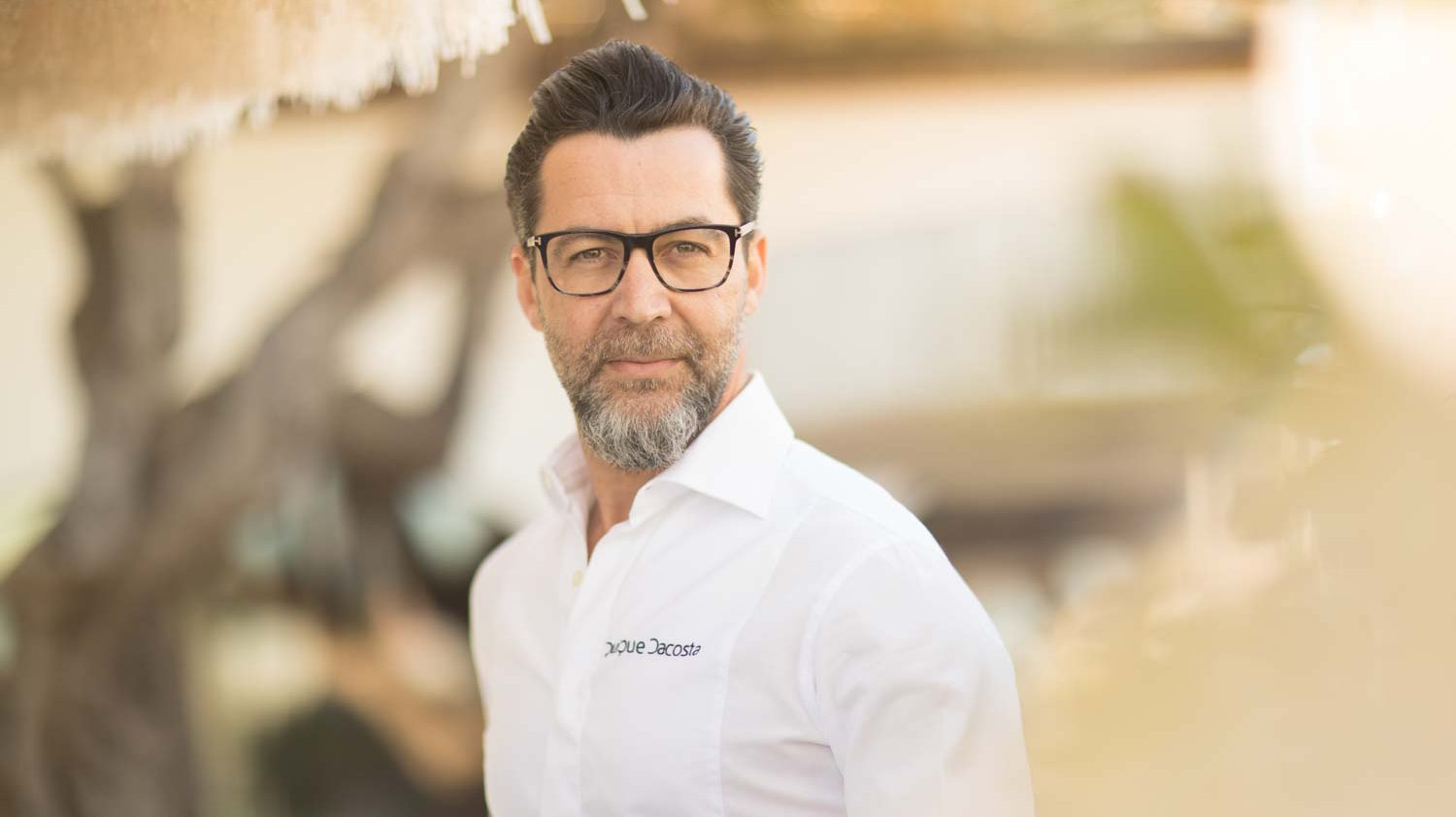A one on one talk with Quique Dacosta
A chef with pivotal gastronomy relevance.

Astonishingly, Quique Dacosta is a self-taught chef, who first came into contact with the restaurant world by chance at the age of 14 when he took a job as a dishwasher in a pizza bar in Denia, Spain. By the age of 17 he was working as a cook at El Poblet, a family- run restaurant. He stayed with the business, developing it into a three-Michelin-star, avant-garde gastronomic magnet under the name Quique Dacosta.
From creating innovative cuisine to devouring the bibles of French cuisine; he always had in mind the idea of learning from the great chefs, yet without copying them or their ideas. Creating his own personal cuisine, focusing only on his own tastes and aspirations, to gain the loftiest accolades in the gastronomy world.
In numerous ways he seeks to revolutionize common things, to give them another angle through studying them thoroughly. Things such as the iconic Valencian ingredient rice. This he researched from each and every angle, as well as gaining more knowledge on how to use the plants in their embryonic stages. He also redefined the Alicante tradition of salt-curing.
After nearly 30 years in the industry he says that being germane to the sector, being a point of reference in the world of gastronomy, is his biggest achievement of being a chef.
In an interview, Dacosta was able to share with us his views, inspirations, challenges, as well as his projects and what he feels will be the major food challenge in future. He didn’t stop there, he also made us realize how far commitment can go and how it can help in the gastronomy business, plus the purposes he feels food should carry.

What is the current state of your business right now? How many restaurants do you have and where do you spend the majority of your time?
After a world pandemic that we have not yet left behind, with all that it has entailed, it is incredible that we have managed to maintain all the businesses - the four restaurants in Valencia, the one with two stars, the three stars in Denia and the wonderful restaurant in London.
Having opened the Mandarin Oriental Ritz Hotel last year in Madrid with six dining outlets inside the hotel, we are in a good moment, but we have to be cautious because of the uncertain times we are living in.
In truth, the business is going very well, we are excited about this. A wonderful team that is making viable projects and business models that are very different from each other surround me.
Do you feel that the industry is starting to feel better after the lockdowns?
It is quite difficult to make an assessment from my perspective. Taking into account that we have these twelve restaurants, six of them inside a five-star luxury hotel in the capital of Spain, in my opinion, society has responded without a doubt by wanting to enjoy the experiences that we offer them in the restaurants.
Culture is associated with eating, going out, enjoying and they have responded in this way. Filling not only our simplest restaurants, such as Mercatbar or Vuelve Carolina, but also the most sophisticated ones, such as Quique Dacosta Restaurante (Dénia), El Poblet (Valencia) or Deessa (Madrid).
Regarding your new adventure with the Mandarin Oriental in Madrid. Tell us why this project was interesting for you and how your cuisine is expressed within the luxurious environment of the hotel?
It is a very important and interesting project for me, because I have been able to develop six dining concepts within the framework of a luxury hotel. I was really lucky to have the opportunity to design, develop and implement them with an extraordinary hotel company that is committed to the highest level of gastronomy in its hotels.
We have designed restaurants from a casual concept such as the Ritz Garden, where you can enjoy rice dishes, salads, fish and grilled meats, to a fine dining restaurant that dreams and works with the same methodology of Quique Dacosta Restaurant.
We have a classic restaurant, a kitchen, a Champagne bar where we offer products and champagne. Two banquet rooms, room service, afternoon tea... I feel so fulfilled with this project that is having great success. I am very proud of what is happening there.
What do you consider your biggest achievement after many years of being a chef?
I think the goal is to continue to be germane for the sector, to be a point of reference in business, in the ways of opening, of growing, of managing the team, with the industry, with the environment. I think that if what we do continues to be a benchmark for fellow chefs, sommeliers, waiters, after so many years in the kitchen, it is something to be proud of.
This industry moves very fast, and to stick as a reference for more than thirty years is the ultimate thing, even beyond the awards. It makes us more alive than ever that colleagues keep coming to all our openings with interest.
What stimulates your inspiration right now?
To continue to create things that are interesting for the industry and rewarding for customers who come from all over the world for a unique experience. Wonderful people, who have idolized and made our proposal big in their heads. I am encouraged by the challenge to keep surprising, evolving and being part of a very dynamic industry.
What do you think will be the major food issues in the future?
I do not like to think about this because they will come to me and I don't like to predict anything. I will meet whatever it is. I will continue to work, keeping a wonderful relationship with the environment, with the products, taking into account a fundamental pillar for us such as sustainability, the respectful relationship with all species that is the most important thing for us. My color palette is products that are in nature, and my relationship with nature has to be respectful and sustainable above all else.
Who do you think are the most progressive chefs in Spain right now?
We are very lucky in this country to have thousands of chefs who evolve gastronomy. There are those who evolve haute cuisine from a thousand perspectives, and others who make a great evolution in other areas of the restaurant industry that are not necessarily haute cuisine. Speaking of haute cuisine as Michelin-starred restaurants.
They are restaurateurs who do not have any stars and who surely do not aspire to them, and yet they are drawing up concepts, techniques or reformulating existing approaches that are making cuisine progress in a more dynamic way than when it seemed that only those of us who were at the gastronomic vanguard generated this progress. There are many colleagues of ours who are doing extraordinary work and who would fill the pages of this publication if I were to list them all.
What is the next big thing in fine dining?
We are creating it at Quique Dacosta Restaurant (Dénia), you will have to come and enjoy it this season or next.
Why do you think there are not more women that are famous chefs?
I don't have the answer but I can say that I know many extraordinary female chefs and my kitchens are full of very talented female cooks, bakers and waitresses in all the restaurants.
What do you think food should represent nowadays; should it surprise, nourish, push for more social inclusion, be sustainable, and have a bigger purpose?
We must try to get haute cuisine, while being tasty, technologically technical, and interesting to not stop nourishing or promoting social inclusion, or being sustainable, or having great purposes beyond putting food on a plate. Cooking is a circular discipline. Versatility in which so many things fit and all nourish each other. The spiral opens up to new challenges that we continue to take on, and we care about things, things that when I started cooking, we never imagined we would take on as our own.
Commitment to creativity is important; it means learning new things and experimenting. What are you learning or experimenting on these days?
Cooking is creativity; we are constantly coming up with solutions and ideas come to our minds. We are constantly doing things in this sense.
What have I learnt? I have learned so many things... However, something curious: in the last few weeks, I have learned to relate to a concept that since the pandemic was far away: the buffet [ referring to the hotel buffet style breakfast ], which is something from almost another era, in a five-star luxury hotel. I am moving forward to a hybrid between what I like and how I like to eat it from my cooking philosophy, and the buffet concept that I have never set up before.
Particularly to make it more contemporary, taking into account the biorhythms, analyzing how the customer behaves and how I want to offer it. I experiment from a creative perspective and I learn by testing. Maybe it is surprising or unexpected, maybe you were expecting me to answer that we are trying to take paella to a space station :) but my learning process, as of now, involves something more on the human side of things - the life of everyday, a day-to-day challenge.
What do you wish more people around the world knew about authentic Spanish cooking? Is there anything you think is misunderstood?
On a general level, traditional cuisines are misunderstood around the world. Paella outside Spain is misinterpreted, even in Spain it is badly executed, pizza in the world is misinterpreted, nigiris and makis, Mexican cuisine, Peruvian cuisine. They are interpreted very differently from the authentic ones.
We wanted to contribute with our small grain of rice to our London project, with which we are taking a step forward to protect at least what is closest to my heart: authentic Spanish rice cuisine. We want to take it beyond our borders, knowing that we have to do more than just business; we have to spread the word. This point is also a challenge for the chefs.
What are a few of the signature foods of Spain you wish everyone could try?
Paella, migas from Extremadura, gazpachos and cold soups from Andalusia, fabada from Asturias, Galician cuisine with its seafood and simple preparations... I think they are all marvellous.
What is the best way to cook an egg?
There are many ways to cook an egg and they could all be the best way. Eggs are probably one of the most versatile products in the kitchen. If we were to take eggs out of the kitchen, an infinite number of preparations would fall apart, and in pastry making even more so. They can all be great: making a French omelette can be the most wonderful thing in the world, a fried egg can be majestic, and an egg cooked at a low temperature with caviar yolks can be extraordinary. So there is a multitude and I don't have a favorite. Right now, a fried egg would suit me just fine because I'm hungry and haven't had breakfast yet. And the egg yolk being grilled, I love it.
